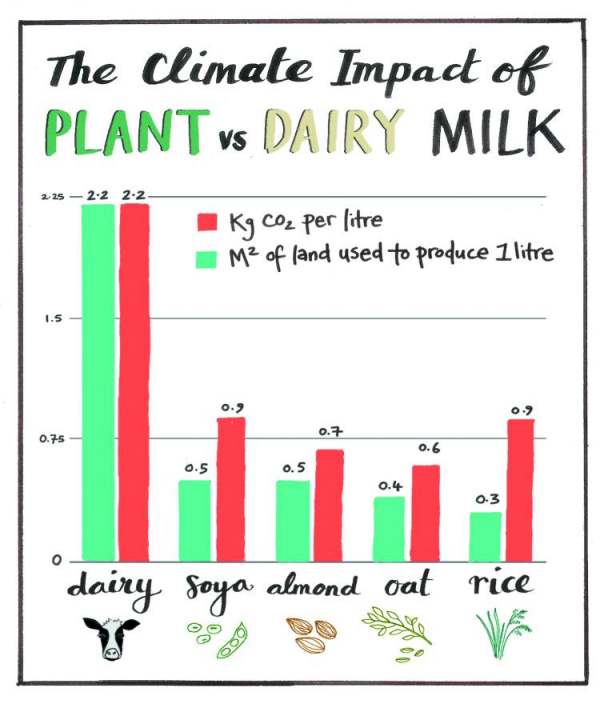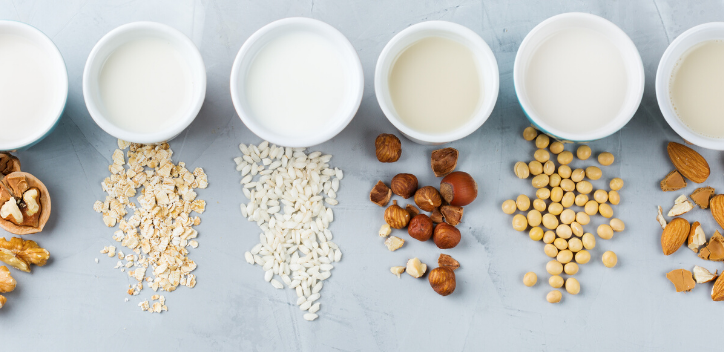Its estimated that 25% of the UK population now enjoy plant milk on a daily basis. Something that has been the staple for the lactose-intolerant and committed vegan is now pouring into the mainstream and we are seeing vegetarians and meat-eaters alike taking the plunge. It’s great news, especially as plant-based milk may be the first step for many towards veganism.
Of course, the rise of a movement will always have its critics and we see this aplenty when it comes to plant-based milk. Reading some of the headlines you’d think that vegans are forging a path to deforestation and sucking rivers dry in their efforts to find an alternative to the cow, leaving the dairy farmers commended in their efforts to produce a glass of the wholesome ‘white stuff’.
Misleading headlines are leaving a whole section of the population concerned about making the switch. Should they trust the soybean over the cow and are all plant-milks created equal? Tim Hunt from Ethical Consumer Magazine explains...
Knowing your nuts from your beans
We should clear up one thing straight away. Any and all plant-based milks are more sustainable and have a lower environmental impact than dairy milk. So, whichever plant you pick you are already making a choice that uses less water, less land, creates fewer pollutants and has a lower carbon footprint.
You can see from the chart below the carbon footprint of the various plant milks compared to dairy.

Image: Ethical Consumer
Broadly, there are three main plant types that can be used to create dairy-free milk:
- Nuts and seeds: including almond, coconut, cashew, hazelnut, Brazil nut, tiger nut, walnut and sesame.
- Cereals: including rice, oat, millet, barley, buckwheat, spelt, quinoa and hemp.
- Beans: including soy, pea and chickpea.
We’ll talk here about the more popular types and the brands showing a real commitment to producing milk in an ethical and sustainable way.
Spoiler alert: we won’t be telling everyone to go out and buy just one type of milk, your choice is complex and personal, but we hope this guide will make things clearer. Let’s start with the creamy stuff inside the carton…
Soya
Soya has been associated with deforestation in South America and has received negative press because of this.
One important thing to keep in mind is that most of the world’s soya is used as animal feed, with only 6% consumed directly by humans. To tackle the issues of deforestation in soy production we really need to look to the meat and dairy industries and force them to change. See our more detailed guide on soya sustainability.
That said, brands can help by not sourcing their beans from areas where a link can be made to deforestation. Soybeans grow well in many different climates and some brands source their soya from Italy and other EU countries. Using supplies closer to the point of manufacture and distribution also decreases the carbon footprint of the milk.
Almond
Another very popular milk variety, almonds have received their share of negative publicity too. This is largely associated with production in the Golden State. 80% of the world’s almonds are grown in California and with wildfires marching through on an annual basis, it is clear that California is suffering from drought condition and has been for the last decade.
Much of the strain on the state’s water has been attributed to almond production but, in truth, California pumps more water into alfalfa crops to feed livestock, and states dairy as a much larger revenue generator than almond production.
Be aware too of the widespread use of pesticides in almond production and the threat to bee populations. You can choose organic brands to avoid this issue.
Coconut
Coconut milk has made its way into the mainstream in recent years. Most coconuts are grown independently in Indonesia, the Philippines and India by smallholders. The market is fraught with instability and low prices. Growing coconuts is a large investment. Trees take time before they are fully established and you can’t swap them out for more profitable crops should the market decline. Once farmers have committed to coconut then they must continue to make what money they can from this crop; this makes them vulnerable and exposed to exploitation and unfair prices. But it’s an area where consumers can have an impact by choosing a brand that’s Fairtrade.
Rice
Rice milk has the largest environmental impact of the plant milks, but this is associated with methane production rather than carbon. Flooded paddy fields produce large amounts of methane, but again this is much less than the impact of dairy farming.
The best of the rest…
Oat, pea and chickpea milks are great alternatives and oat and pea are becoming more mainstream. These cool-climate crops are great news for local farmers and help to keep the carbon footprint down. Pea and chickpea have another nifty trick under their shells as nitrogen-fixing plants. Growing peas uses less fertiliser and actually helps to regenerate the soil for other nitrogen-hungry crops.
If you’re looking to supercharge your porridge, then oat milk is another creamy alternative but watch out for glyphosate pesticides, even in organic crops, but some brands do guarantee glyphosate-free milk.
Hemp is another emerging milk, naturally pest and weed-resistant and using little water, it’s now legalised in many areas of the world.

Nutrition
This one is vital for vegans. Without the cocktail of nutrients afforded by dairy products, we need to make sure that we get what we need elsewhere. Most plant milk is fortified with various vitamins and minerals, so always check the label to see what else has been added to your milk to ensure you get a good balance.
Plant milk can vary widely when it comes to protein and since this is a food group that can be lacking in the vegan diet it makes sense to load this into your milk. The Department of Health in the UK recommends that men consume 55.5g of protein a day and women 45g.
Bean milk such as pea, chickpea and soya have protein levels nearing that of dairy milk, at around 2-3.5mg of protein per 100ml.
Nut milk varies at between 0.5-1.0 mg per 100 ml, but oat milk only has 0.2g and rice and coconut have nearly none.
It’s not all about the ethics and sustainability, although these are very important, we need to make sure that we are getting the nutrients that we need to build and maintain healthy bodies too.
Vegan brands to support
There are some great vegan brands out there that are leading the way when it comes to sustainable and ethical business. They are also registered with the Vegan Trademark.
We recommend these vegan brands which each carry our Best Buy mark:
There are many great brands out there doing amazing things to produce nutritious, sustainable and delicious milk alternatives. All plant milk is better than dairy so if you’ve already made the switch, you’re doing the right thing.
If you want coconut milk, choose FairTrade.
If you want almond milk, make sure it’s organic.
And to our friends and families who haven’t yet seen the benefits: stop chewing the cud, pardon the pun, and make the switch for the planet and for the cows.
For more information on ethical consumerism and to see our detailed guides on everything from shampoo to washing machines, visit the Ethical Consumer website.
If you would like to register your product with our Vegan Trademark you can contact our Trademark team at +44 (0) 121 523 1730 (reception line) or by email at trademark[at]vegansociety[dot]com.
The views expressed by our bloggers are not necessarily the views of The Vegan Society.

